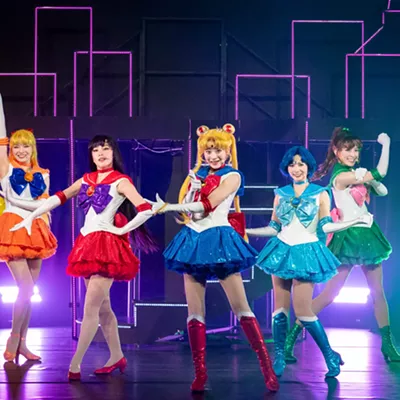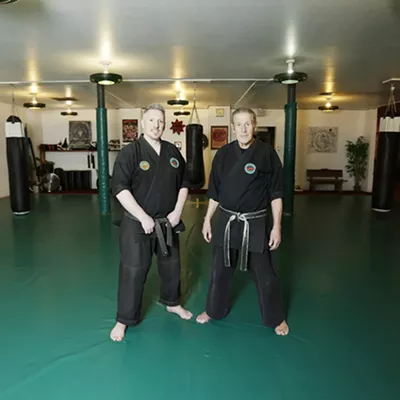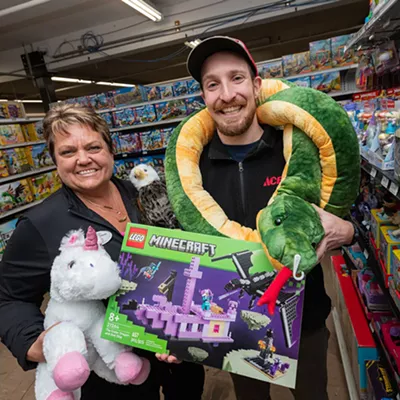Before now, has there been a period in American history that could be more aptly described as "Orwellian" since that oft-invoked term first came about?
Not content with the bully pulpit of social media, our national figurehead has taken Two Minutes Hate — that "hideous ecstasy of fear and vindictiveness" — on the road, holding feverish rallies in which he peddles conspiracy theories and revels in the exercise of power for its own sake. He and his spokespeople deal on a daily basis in deceptive newspeak like "alternative facts" and "fake news" and his own lawyer appears on 24/7 cable infotainment channels to make paradoxical assertions intended only to foment uncertainty: "Truth isn't truth."
And then there's the casual surveillance through Facebook and smartphones, the ever-growing gap between everyday citizens and a privileged elite, the distortion of reality through decontextualized images and deepfakes.
Given the current state of affairs, it was likely only a matter of time that Spokane Stage Left, ever the firebrand of the local theater scene, would stage an adaptation of 1984, George Orwell's dystopian socio-political parable that depicts life and love under a regime that cultivates and channels tribalism, fear and myopia, retaining control and suppressing dissent in ways both heavy handed and insidious.
"I've noticed that most people know the idea of Big Brother, and they'll comment, 'Oh, that's super relevant right now,' but they haven't read [Orwell's novel] or have just heard about it," says Chris Wooley.
After last overseeing the technological portent Two Point Oh at Spokane Civic Theatre back in March, Wooley is directing this production of 1984. Though he almost wasn't.
"We actually selected this version by accident," he says. "When Stage Left said they wanted to do 1984, they were reading a different version of it, and when they ordered the scripts for me to read, they ordered in the one by Michael Gene Sullivan. I read it and absolutely fell in love with how creative this take on it was versus the traditional versions that are out there."
That led to rights issues, though, because Orwell's estate restricts nonprofessional theaters to just one version of the play — not the first time, incidentally, that the estate has lent itself an air of Big Brother. The theater had to appeal to Sullivan and other Orwell-related organizations personally, all of which ultimately gave their consent.
"This [version] is so perfect for Stage Left as a small, intimate theater. What I like about it is that it focuses more on the people and less on the traditional 1984 plot. The basis for the show is that we're in an interrogation room, Room 101, where Winston [Smith], the lead, is getting tortured and confessing to his crimes. So it's a small cast. There's only six members and they're all onstage the entire time."
The always-present ensemble cast — J.P. O'Shaughnessy, Dahveed Bullis, Aubree Peterson, Kyle Ross and Herron Davidson — then re-enacts key scenes as seamless flashbacks that Winston, played by Rio Zavala, recalls under duress.
"Emotional intensity is the perfect word for what goes on," Zavala says. "I do spend most of the show getting tortured onstage. But in a weird way, it's a dream-come-true challenge for an actor. Can you feel positivity in any way, shape or form? Is happiness the same thing for a person in that society as it is for a person in a society that's shockingly close but without the exaggeration?"
Up to now, Zavala has primarily identified as a musician and musical-theater actor. To better prepare for this physically and emotionally exhausting role, he watched the Michael Radford film, opportunely released in 1984, which starred John Hurt as Smith.
"I was kind of apprehensive about getting on the phone [with a doctor] and saying, 'How does it feel when bolts of electricity course through your body? Just asking for a friend!'" he laughs.
In stark contrast to Two Point Oh, Wooley says he's "removed all technology," such as 1984's ubiquitous telescreens, in order to place more focus on the "human element" of the story. He and set designer Chris Brock have instead constructed a claustrophobic, abstractly tiered set reminiscent of "descending into a basement."
"In the center of the set is a giant eyeball that represents what the screen would be. So we've got the man behind the curtain that's conducting this interview and leading everything right behind that eyeball. We still have that aspect of the government watching us, but it's a low-tech version of it," he says.
"It's a bit intimidating. Just seeing everything down there with the power of that eye staring back at you with the pretty neutral-looking set, it's pretty startling." As is the action itself. Wooley warns audiences to expect "graphic content, nudity, violence" and occasionally distressing subject matter.
"Complacency has become a trend," Zavala says. "It's important that people come into this show prepared to be challenged, to be a little scared and a little angry." ♦
1984 • Sept. 7-23; Fri-Sat at 7:30 pm, Sun at 2 pm • $20 • Stage Left Theater • 108 W. Third • spokanestageleft.org • 838-9727























